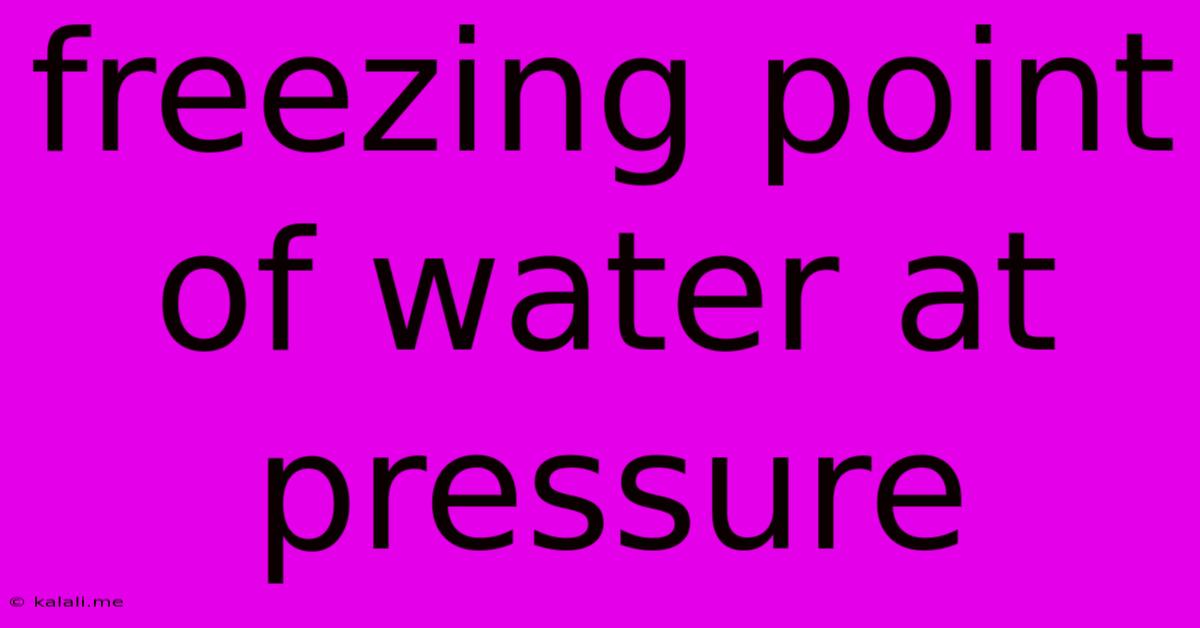Freezing Point Of Water At Pressure
Kalali
Jun 05, 2025 · 3 min read

Table of Contents
The Freezing Point of Water: More Than Just 0°C
The familiar fact that water freezes at 0°C (32°F) is a simplification. While this is true at standard atmospheric pressure (1 atmosphere or 101.325 kPa), the freezing point of water is actually sensitive to changes in pressure. Understanding this relationship is crucial in various scientific fields, from meteorology to materials science. This article delves into the fascinating relationship between pressure and the freezing point of water.
Understanding the Phase Diagram
The best way to visualize the effect of pressure on the freezing point of water is through a phase diagram. This diagram shows the different phases of water (solid ice, liquid water, and gaseous water vapor) under various conditions of temperature and pressure. It reveals that the line separating the liquid and solid phases doesn't have a constant slope. Unlike most substances, the freezing point of water decreases as pressure increases.
Why Does Pressure Affect the Freezing Point?
This seemingly counterintuitive behavior stems from the unique properties of water. When water freezes into ice, it forms a crystalline structure that is less dense than liquid water. This is why ice floats. This lower density means ice occupies a larger volume than the equivalent mass of liquid water.
Increasing the pressure on liquid water forces the water molecules closer together. This counteracts the tendency for water to expand upon freezing. Therefore, to induce freezing under higher pressure, a lower temperature is required.
The Clapeyron Equation and its Application
The quantitative relationship between pressure and freezing point is described by the Clapeyron equation, a thermodynamic equation that relates changes in temperature and pressure during a phase transition. While the precise calculation is complex and requires knowledge of thermodynamic properties, the equation confirms the inverse relationship between pressure and the freezing point of water.
Real-World Implications
The pressure dependence of water's freezing point has several important real-world implications:
- Ice Skating: The pressure exerted by the skate blades on the ice causes a localized melting of the ice, creating a thin layer of water that reduces friction, allowing for smoother skating. This is a classic example of pressure lowering the freezing point.
- Glacier Movement: The immense pressure within glaciers can lower the freezing point of the ice, contributing to glacial flow and movement.
- High-Altitude Freezing: At higher altitudes, the atmospheric pressure is lower. Consequently, water freezes at a slightly higher temperature than 0°C. This is why it can be colder at high altitudes, and water can freeze more easily.
- Scientific Research: The pressure-freezing point relationship is crucial in various scientific experiments and techniques involving the study of water and ice. Researchers utilize this knowledge in diverse fields.
In Conclusion:
The seemingly simple statement that water freezes at 0°C is only true under specific conditions. In reality, the freezing point of water is a function of pressure, decreasing as pressure increases. This unique property, a consequence of water's anomalous density behavior, has significant implications across various scientific disciplines and everyday phenomena. Understanding this relationship provides a deeper appreciation of the complex behavior of water, a substance crucial to life on Earth.
Latest Posts
Latest Posts
-
In The Supreme Triumph Of Gods Will
Jun 07, 2025
-
How Do You Cook Tamales Without A Steamer
Jun 07, 2025
-
Configure Error C Compiler Cc Is Not Found Ubuntu
Jun 07, 2025
-
How Do Door Side Windows Attach
Jun 07, 2025
-
How To Uncompress A Ram File
Jun 07, 2025
Related Post
Thank you for visiting our website which covers about Freezing Point Of Water At Pressure . We hope the information provided has been useful to you. Feel free to contact us if you have any questions or need further assistance. See you next time and don't miss to bookmark.